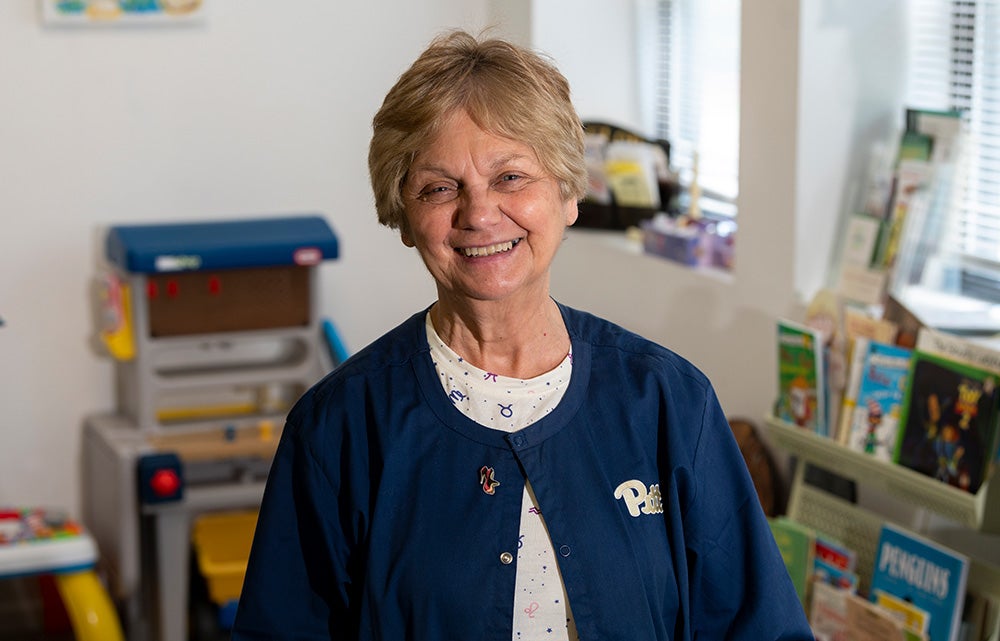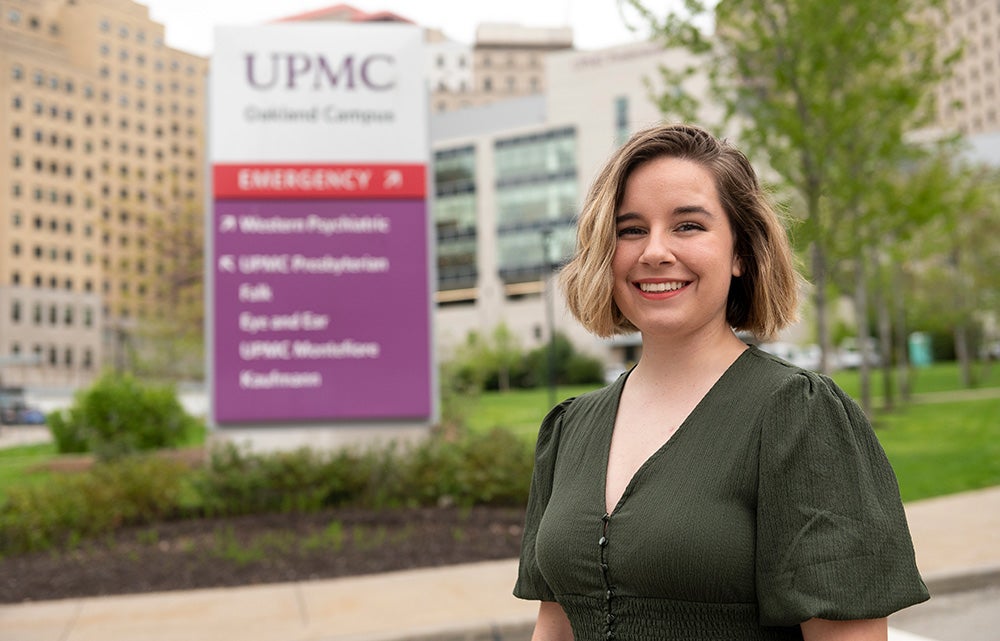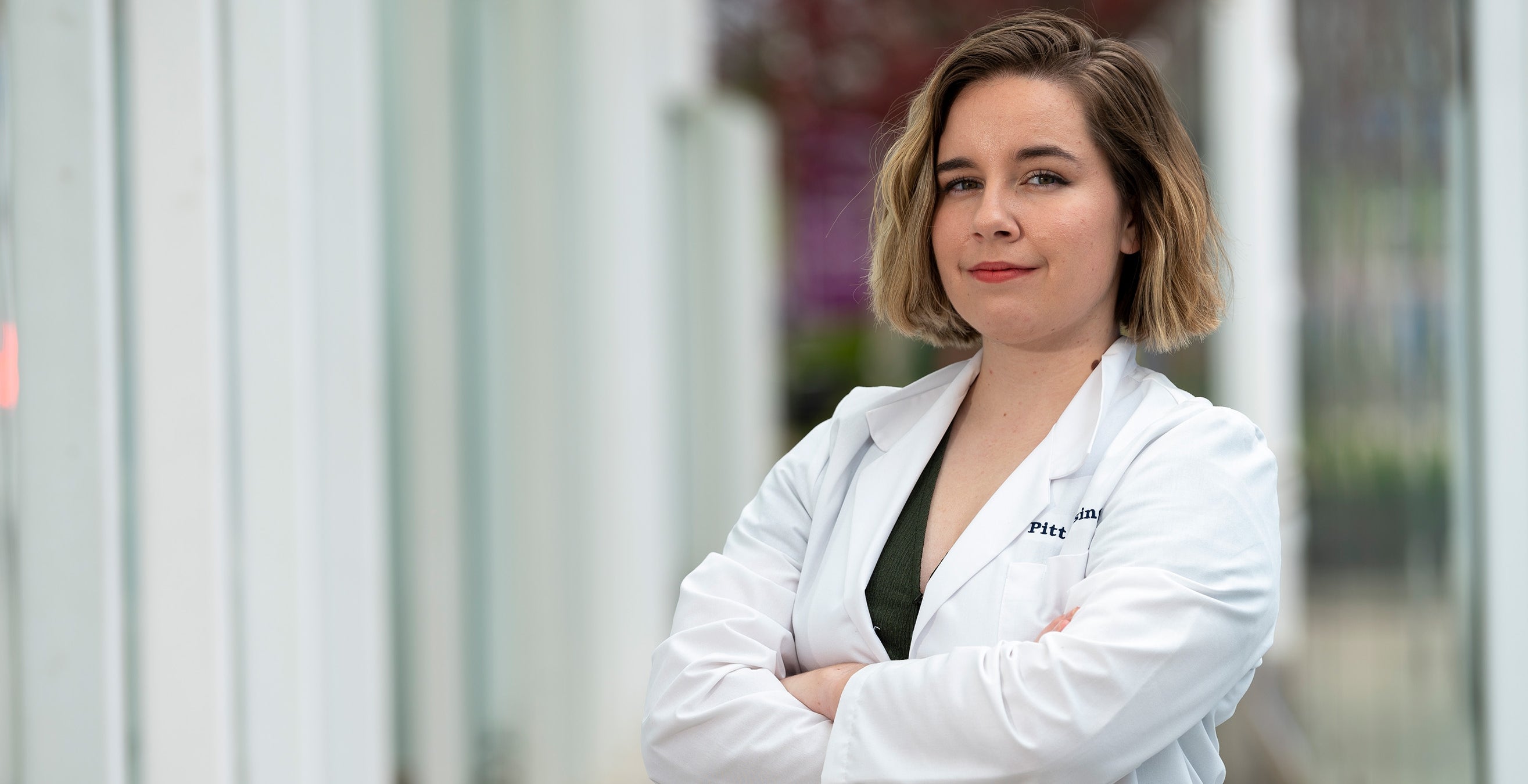The second-year nursing student looks at herself in the mirror one last time, checking and rechecking that all is as it should be. Her new uniform — a white-collared, short-sleeved, zip-up shirt; navy blue pants; and white sneakers — has no stains or wrinkles. Her hair is pulled up and back in a ponytail, away from her face. Her fingernails are short and clean, all traces of polish removed. A wristwatch and stethoscope are her only accessories, except, of course, a clear badge holder pinned to her chest, ensuring that her University of Pittsburgh nursing student ID is visible to all.
On this fall 2019 day, Victoria Zubiri starts her first clinical practicum, a critical component of her formal nursing education. Over the next three years, she will work at clinical sites around Pittsburgh, gaining hands-on experience while rotating through community health and the many specialties open to her, such as geriatrics, intensive care, maternity, surgical care, psychiatry and pediatrics.
Zubiri’s clinical education begins at a nursing home not far from the Pittsburgh campus. There, she’ll work alongside a clinical supervisor — known as a preceptor — and the facility’s staff.
But before she steps through the nursing home’s doors, the young woman wants to look the part of a future nurse, even if she doesn’t feel it yet. For Zubiri, it’s a matter of pride.
The expectations are high, after all. Nurses have been the United States' most trusted professionals for the past 20 years, according to Gallup’s Honesty and Ethics of Professions Ranking. The regard is well-founded: Higher concentrations of nurses, especially those who have received advanced training, correlate with better health care outcomes.
The need to keep building the nursing workforce is essential. More people are 65 years old or older than ever before, a number that’s expected to reach 73 million by 2030 (compared to just 41 million in 2011). This demographic shift alone creates considerable need for more geriatric care nurses, as well as most nursing specialties. And with an estimated one million nurses retiring by 2030, and the COVID-19 pandemic continuing to take its toll on the health care system, having incoming nurses like Zubiri is crucial.
Yet, even though there has been a recent uptick in applicants for nursing education, the profession is facing an alarming predicament. For the 2019-2020 academic year, almost two-thirds of nursing programs turned away qualified students because of a lack of nursing faculty or clinical preceptors, according to the American Association of Colleges of Nursing. The shortage is preventing tens of thousands of hopeful nurses from the opportunity to enter the field.
Pitt’s School of Nursing, founded in 1939, is doing its part to address these problems, working to ensure that qualified nurses are getting to the patients and medical practices that need them, particularly in Pennsylvania. There are thousands of actively practicing Pitt-educated nurses spread across all 67 counties of the commonwealth. Every year, almost two-thirds of Pitt’s bachelor of nursing graduates stay in the state to work.
In addition to preparing graduates like Zubiri to help ease staffing shortages statewide and nationally, the school produces alumni who become leaders beyond the clinical environment as well as specialists in different kinds of clinical care. Pitt alumna and Assistant Professor Catherine Grant is one of many alumni who knows firsthand how graduate nursing education opens doors. Nurses have many career paths available to them, she says. “It’s just a matter of reinvention.”
Pitt Nursing alumni reflect this diversity: They have gone on to lead several nursing schools in Pennsylvania, throughout the United States and internationally, says Jacqueline Dunbar-Jacob, the dean of Pitt’s School of Nursing and a distinguished service professor. Some Pitt nurses have gone on to help shape health care policy that affects the entire commonwealth; still others have become nurse practitioners (NPs) who provide primary care in a variety of medical settings, including communities where health care is not readily accessible. Dunbar-Jacob adds that the school is among the country’s highest National Institutes of Health–funded nursing research institutions.
In the 2021 rankings by the U.S. News & World Report, Pitt’s Bachelor of Nursing degree program was 7th best in the country; the Doctor of Nursing Practice program was 7th, and the Clinical Nurse Leader program was 1st in online master’s programs.
The School of Nursing’s numbers are good, but the people behind those numbers — and the things they do for their patients — are even better.
 Grant thought she knew health care’s realities. She had worked as a registered nurse for 15 years before deciding to further her nursing education through Pitt’s Family Nurse Practitioner (FNP) program (then a master’s degree) in the mid ’80s. The experience changed her, however, and the rural Pennsylvania community she calls home.
Grant thought she knew health care’s realities. She had worked as a registered nurse for 15 years before deciding to further her nursing education through Pitt’s Family Nurse Practitioner (FNP) program (then a master’s degree) in the mid ’80s. The experience changed her, however, and the rural Pennsylvania community she calls home.
The FNP program educates its students to serve as primary care providers in clinics, urgent care centers, home health care services and outpatient care centers. Graduates are prepared to autonomously diagnose and treat conditions, prescribe medications, order and interpret diagnostic tests, design treatment plans and teach patients about managing illnesses.
As part of her master’s thesis, Grant developed a research study in Slickville, Pennsylvania — a small community about 30 miles east of Pittsburgh — where she grew up, started her family and would continue to live decades later. By surveying locals’ opinions about NPs, she says she discovered that the people of her hometown felt they didn’t have easy access to health care and would welcome having an NP for primary care.
Those conclusions in her master’s thesis led Grant (NURS ’88G) to found Associates in Family Healthcare in 1991. It was Pennsylvania’s first health care practice run and owned by an NP.
“People were eager for us to open,” Grant recalls. “During our open house, someone from a neighboring town came in sick, so I saw them.”
More than three decades later, she reports that her practice is still growing and providing all age groups with a wide range of services — from smoking cessation and diabetes prevention to mental health counseling and primary care.
“The youngest patient I’ve seen in my office was one day old,” say Grant, whose oldest current patient is 94. “And we’ve always done home visits” for people who are unable to travel to the office.
She has company in treating patients: Pitt Nursing faculty members Timothy Coleman and Joshua Palmer (A&S ’03, NURS ’17, ’20G) also regularly provide care at the Slickville practice.
With noteworthy numbers of nurses and doctors retiring, Grant believes NPs will be in great demand. They can offer immediate and personalized care — and they have the know-how to refer patients with greater needs to doctors and specialists.
Grant has helped nurture the next generations of NPs, even as she served thousands of patients and, more recently, helped her community deal with the pandemic. Over the past 10 years, she’s taught core clinical classes for aspiring NPs as an assistant professor of nursing at Pitt. Through her practice, she’s also served as preceptor for at least 100 students training to be NPs, including those from Pitt. One of her students was her daughter, Erin Splendore (NURS ’17G), whose DNP final project zeroed in on a facet of her mom’s practice.
Grant believes that immersion and mentorship in a clinical setting such as her practice are critical for nurse education. “When students leave here,” she says, “they’re screening calls, they’re coordinating care, they’re ordering medications and treatments. They’re ready to fly.”
Grant continues to fly, too. “The majority of people I care for are so grateful when I’m able to diagnose them, answer their questions and bring some solace to their life. It’s just very rewarding.”
 Although Zubiri always wanted a gratifying job, she didn’t always imagine herself in health care.
Although Zubiri always wanted a gratifying job, she didn’t always imagine herself in health care.
“I think my parents knew I should be a nurse way before I did,” she says.
The daughter of two engineers, she hadn’t really thought about nursing until middle school, when her father was diagnosed with cancer. “The nurses changed our entire experience of those days in the hospital we got to spend with him,” she recalls. “The nurses showed me how you can really change a whole family’s experience in this really hard moment.”
When it came time to start thinking about college, her mom encouraged her to consider applying to nursing schools. “I thought, ‘My mom says so, and she’s been right before, so I guess I’ll do it,’” she laughs.
It became less of a guess and more of a certainty after she shadowed her oldest sister, who worked as a physical therapist in a hospital. Zubiri took particular notice of the nurses as they worked with patients, doctors and other staff. In looking further into nursing, she was drawn to the career’s flexibility, with its many specialties and, as Grant says, its possibility for “reinvention.”
“You can decide how far you want to continue your education,” Zubiri says, “and whether to focus on clinical care, teaching, research or even policymaking.”
Above all, she says, “I was always drawn to wanting to help people and being involved in other people's lives.”
Pitt’s robust clinical opportunities stood out to the hopeful nurse while she was looking at colleges. After submitting her application, she was invited to apply for the UPMC Scholars Program — a scholarship and employment partnership between Pitt’s nursing school and the University of Pittsburgh Medical Center (UPMC). The program provides full tuition to select incoming undergraduate nursing students who, upon graduation, will have the opportunity to work and receive mentorship for three years at one of UPMC’s dozens of hospitals throughout western and central Pennsylvania.
Zubiri earned a spot.
“I was able, as a high schooler, to already know that I'm guaranteed a job post-graduation, which was something that I don't think any other school could have ever offered me.”
However, that’s far from the only reason she chose Pitt. An Irvine, California, native, she often talks to friends from home who attend nursing schools in Texas, Michigan and California. The way they describe their education is “so different,” says Zubiri.
“One thing I’ve been hearing often is that, because of nursing shortages often exacerbated by the pandemic, a lot of nursing schools are unable to find preceptors for nursing students to go into hospitals for clinicals.”
That’s not the case at Pitt, where nursing students are guaranteed clinical placements.
“We've always done it a little bit differently” at Pitt, says Jason (Jake) Dechant (A&S ’94, ’96G, SPH ’12G), who has been teaching introductory nursing courses at Pitt since 1997 and taught Zubiri in her first year. Unlike at many other nursing schools, where students don’t immediately begin their studies in a nursing program, Pitt’s students “matriculate right into the School of Nursing from the start,” he says. “So, early on in their first year, they're getting exposed to nursing-specific courses and some clinical shadowing experiences. It gets them immersed right off the bat. And by fall semester of their sophomore year, they're already doing clinical rotations in the hospital.”
The way courses are often taught helps prepare students, too.
Dechant describes his teaching style as that of a storyteller. He likes to talk about real-world examples and has a collection of stories to share — some from his own life experiences, others he’s heard from former students. This is an important part of teaching, he says, because not everything is best learned through a textbook. “It’s so great to be able to tell my first-year students, ‘Oh, I taught a current junior or senior who had this crazy experience,’ because I think that helps keep them interested and motivated, shows them what they’re working toward.”
He also frequently emphasizes a nurse’s role as an “interpreter,” as well as a caregiver. “I always tell my nursing students that part of your job is being able to interpret the technical side of medicine to patients and families,” Dechant says, “because it can be terrifying when you're in the hospital and you don't know anything about what is going on.”
It’s a role Zubiri grows into. As the days, months and semesters pass and she accumulates experience from hundreds of clinical days, her morning routine changes. The nervousness on her first day about appearing professional has given way to confidence in working and learning alongside her peers and preceptors.
“Being a hands-on person, I don't really learn things unless I practice them,” she says. “So, everything that I ever learned in clinicals is what sticks with me.”
She remembers one such educational experience from a hospital internship the summer before her senior year, which demonstrated the importance of her role as an interpreter. Her colleagues were preparing a patient — a woman who had been born in Puerto Rico — to go home after treatment. Zubiri remembers observing as the nurses went over the discharge directions with the patient in English. As the patient was about to leave, Zubiri, a native Spanish speaker, said goodbye:
“Fue un placer conocerte. Adios.” (“It was a pleasure to meet you. Goodbye.”)
The patient’s reply surprised the nurse-in-training.
“She asked me a question in Spanish that was already covered in the discharge instructions,” remembers Zubiri, who then asked the woman if she understood what she needed to do to take care of herself. Only bits and pieces, the woman replied, so Zubiri knew what she needed to do.
“I was like, ‘Okay, how about we go over this again?’ It’s so easy to assume that patients are going to understand everything we say, which of course isn’t true. That really helped break that barrier in my head.”
Zubiri has now finished her degree requirements. She graduated last spring and participated in the School of Nursing’s traditional pinning ceremony, where graduates are symbolically welcomed into the profession by the faculty and preceptors who taught them. This summer, she embarked on her full-time career as a cardiothoracic nurse at UPMC Presbyterian in Pittsburgh, where she completed one of her clinical rotations.
When she looked in the mirror before that first day of work, she was once again be nervous. “Every single nurse I've ever talked to says that the first year was always the hardest,” she says.
But Zubiri knows that she doesn’t take these next steps alone. She has alumni like Grant in her corner, whose professional journeys providing needed care to thousands provide inspiration. And she has education and wisdom bestowed on her by instructors like Dechant, who couldn’t be prouder.
“I can’t think of anyone I would like to teach as much as I love teaching nurses,” he says. “Faculty will often hear from medical professionals who say, ‘We like Pitt nurses; they know how to think critically and on their feet.’ And that makes us feel good; that’s what we hope for.”
Zubiri is confident now that she more than just looks the part.
She is ready for the challenge.
Cover image: Vicky Zubiri in her white nurse's coat.
This story first appeared in Pitt Magazine’s digital Spring 2022 issue. It was reprinted in the Fall 2022 issue and updated online on October 11, 2022.

